By Mali Velasco
An innovative technology, developed with funding from the NIEHS Superfund Research Program, successfully removes PFAS from water. The technology has been adapted to a variety of applications, including tabletop filters, whole-house water filtration systems, and large-scale cleanup projects.
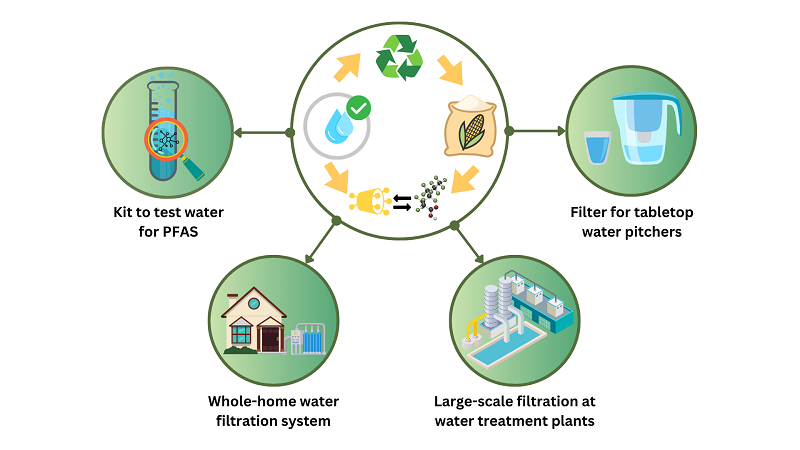
The Problem
PFAS are a group of nearly 15,000 human-made chemicals used for decades in a variety of industrial and consumer products, such as firefighting foam and food packaging. Due to chemical bonds within the molecules that are hard to split, PFAS resist natural degradation and can accumulate in ecosystems and organisms, exposing people through drinking water, food, and dust. The chemicals have been linked to a variety of health effects, including changes in immune and liver function, obesity, diabetes, certain cancers, and lower birth weights.
Current technologies used to remove contaminants from water, such as activated carbon and ion exchange treatments, do not work well for some PFAS. These approaches also have low molecular selectivity — meaning that they are less effective when other substances besides PFAS are present, which is often the case for contaminated drinking water systems.
SRP Solutions
Funded by an SRP small business innovation research grant, Cyclopure, Inc., developed a sustainable technology to bind and remove PFAS from drinking water. Their technology is made of cup-shaped cyclodextrins — sugar molecules bound together in small rings — derived from corn starch. At less than a nanometer across, the cyclodextrin cup can rapidly bind and trap a variety of PFAS compounds faster and more efficiently than other filtration materials.
The technology can remove all 40 PFAS targeted in the U.S. Environmental Protection Agency (EPA) PFAS Roadmap and is certified by the National Sanitation Foundation International (NSF) as safe for drinking water treatment.
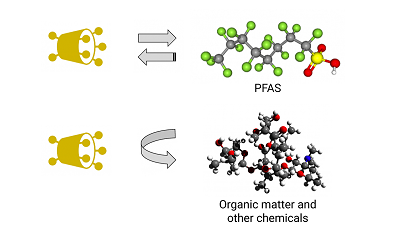
Cyclopure’s cyclodextrins, called DEXSORB, have molecular selectivity for PFAS, while avoiding competition by natural organic matter and other chemicals. (Image courtesy of Cyclopure)
After cyclodextrins trap PFAS molecules, the contaminants can be separated from the cyclodextrins in the laboratory, where the waste is concentrated for safe handling and disposal by destruction technologies without recontamination of the environment. During separation of PFAS waste, the technology undergoes regeneration, allowing reuse of the adsorbent for additional water filtration activities.
In 2022, SRP provided Cyclopure with additional funding to use their technology in developing products that detect PFAS and remove them from water. The new grant allowed the team to pursue PFAS removal solutions for consumer and municipal applications.
Testing Water for PFAS
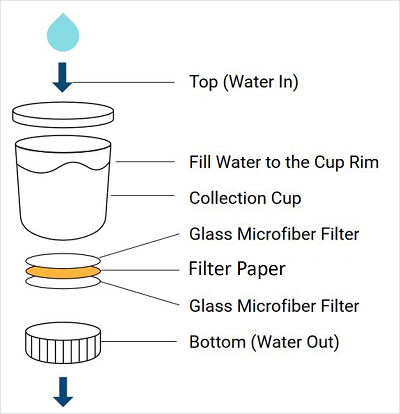
The water test kit includes a collection cup with a filter disc between two glass microfiber filters. (Image courtesy of Cyclopure)
Cyclopure developed a kit to test water for PFAS. The kit is listed by NIEHS as a Sensor Technology for the 21st Century.
Their water test kit uses a collection cup with a filter paper made with cyclodextrins that traps PFAS as water flows through it. After collecting a sample, the user returns the kit to the company’s laboratory, where it is analyzed for 55 different PFAS compounds. According to Cyclopure, their approach is more cost-effective than currently available technologies and more convenient because the user does not need to ship water samples. Users are sent a detailed report about their sample, including concentrations of each PFAS detected and location-relevant information, such as state drinking water regulations.
The water test kits have been used to test tap water, rivers, lakes, and streams by consumers, government agencies, research institutions, and environmental groups across the U.S. and abroad. The Colorado Department of Public Health and Environment is using the test kit as part of a program to test the water of residents who rely on private wells for drinking water. The test kits have also been used in Japan, the Netherlands, and Bangladesh.
Treating Home Drinking Water
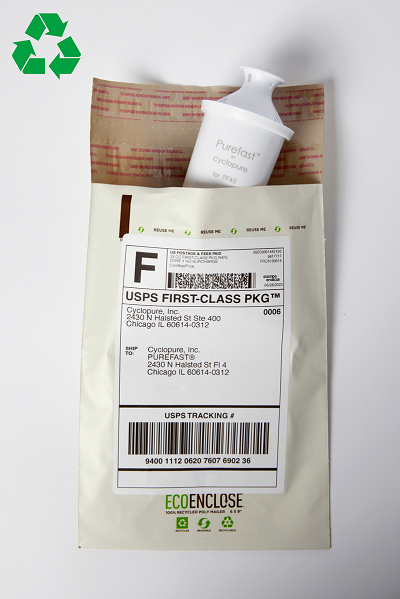
Each cartridge comes with a prepaid label to return the filter to the lab where the contaminants are safely disposed, and the filters are recycled. (Image courtesy of Cyclopure)
In 2022, partly funded by the National Science Foundation, Cyclopure developed a filter cartridge that is packed with cyclodextrins to trap and remove PFAS from water. The filter cartridge is compatible with commercial tabletop pitchers and can provide up to 65 gallons of PFAS-free water. The filters remove PFAS to non-detectable levels well below EPA’s drinking water limit of 4 parts per trillion.
Families across the U.S. are using the filter cartridges to prevent PFAS exposures from drinking water. Municipalities, including communities in Colorado, have purchased cartridges to provide safe drinking water to households as an interim solution while they prepare for large-scale water treatment systems.
The company also developed whole-home filter tanks that connect to residential water systems to remove PFAS from tap water throughout the home. Because not every consumer can install a whole-home water filtration system, such as those who rent, an under-the-sink filter that would be more convenient to install and less costly than the whole-home filters is under development.
Large-Scale Water Treatment
The PFAS-removal capacity of cyclodextrins in large-scale applications is demonstrated through pilot installations across the U.S. These pilots have led to commercial installations to clean up PFAS-contaminated water in:
- Municipal drinking water plants
- Landfills
- Groundwater
- Industrial wastewater
In 2024, the Massachusetts Department of Environmental Protection approved the use of the company’s cyclodextrins to remove PFAS from drinking water systems throughout the state. This approval followed 12 months of pilot testing in Newburyport and Lynnfield, Massachusetts, that successfully demonstrated reduction of PFAS in water to nondetectable levels throughout the study period. Additional pilot testing is ongoing at municipal drinking water plants in Maryland, Alabama, and Nevada, with additional installations slated for New Hampshire, Pennsylvania, Georgia, and North Carolina. The company will install a full-scale treatment system in Alaska at the beginning of August 2024.
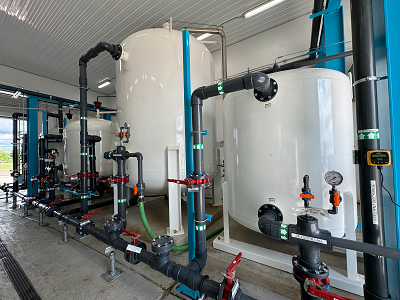
Water filtration system using cyclodextrins at Biddle Air National Guard Base. (Photo courtesy of Cyclopure)
Also in 2024, Cyclopure began a pilot study to treat contaminated groundwater with PFAS at the Willow Grove Naval Air Station in Pennsylvania. The team installed a full-scale treatment system at another Department of Defense site in the state, the Biddle Air National Guard Base.
The company has been working with landfill operators in Michigan and Pennsylvania to demonstrate removal of PFAS from landfill leachate. Landfill leachate forms when rainwater filters through wastes placed in a landfill and often contains high concentrations of PFAS leaching from different household goods.
The technology is also being used to remove PFAS from industrial waste streams, with full-scale treatment systems operating at a metal plating plant and petroleum facility.
Lowering Treatment Costs
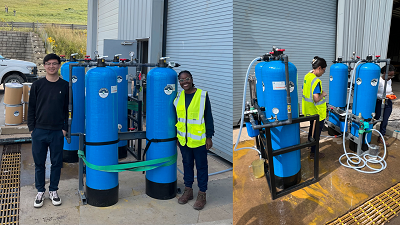
Cyclopure staff members conduct pilot tests in a landfill leachate treatment plant in Michigan. (Photos courtesy of Cyclopure)
In a year-long pilot test to remove PFAS from wastewater at a metal plating plant in Michigan, Cyclopure demonstrated that their technology requires less material to clean up water than currently used water treatment methods. Compared to the plant’s approach that used 180,000 pounds of activated carbon, Cyclopure was able to accomplish similar performance using 21,000 pounds of cyclodextrins.
“We hope that our technology can help lower the cost of water treatment efforts and boost sustainability, preventing PFAS exposures and ultimately protecting human health,” said Cyclopure chief executive officer Frank Cassou.


